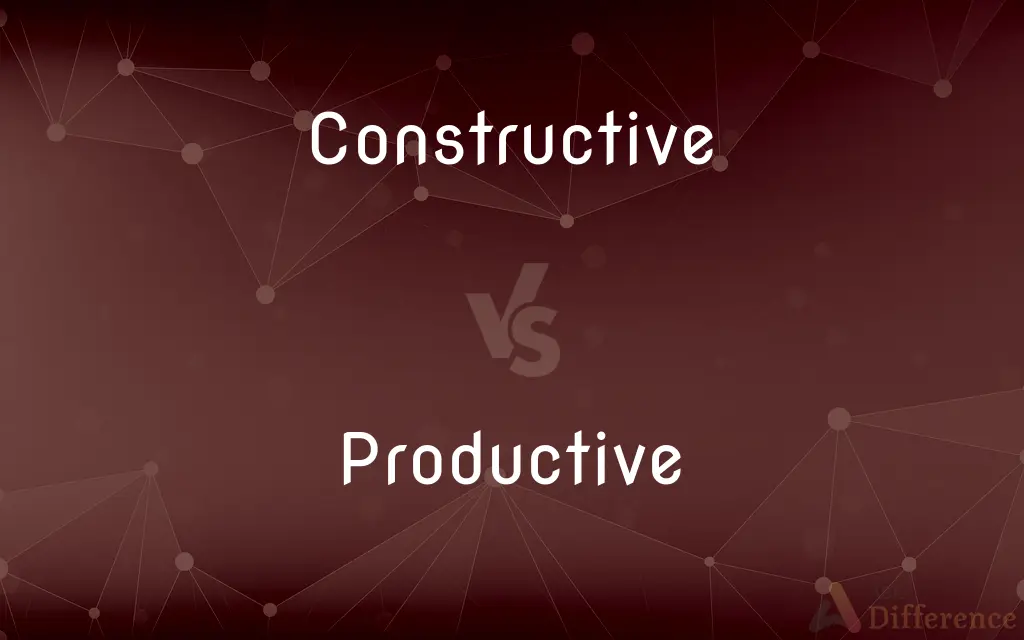Constructive vs. Productive — What's the Difference?
By Urooj Arif & Fiza Rafique — Updated on March 11, 2024
Constructive criticism aims to improve future performance by providing feedback, while productive activities directly result in tangible outcomes or efficiency.

Difference Between Constructive and Productive
Table of Contents
ADVERTISEMENT
Key Differences
Constructive criticism is focused on providing feedback that aims to improve someone's actions or work in the future. It emphasizes growth and development through guidance and suggestions. On the other hand, productive activities are measured by their outcomes, specifically in terms of output, efficiency, or the creation of value. These actions directly lead to tangible results, whether in personal accomplishments, work productivity, or economic gains.
Constructive feedback often involves a careful assessment of performance, highlighting both strengths and areas for improvement. It's designed to encourage reflection and personal or professional development. Whereas productive tasks are evaluated based on their end products, such as completed projects, achievements, or the attainment of goals, prioritizing efficiency and effectiveness in producing results.
In the context of teamwork, constructive interactions facilitate a supportive environment where individuals feel valued and motivated to enhance their skills. This approach fosters a culture of continuous improvement and learning. In contrast, a focus on productivity within a team aims at maximizing output, often through streamlined processes, clear objectives, and optimized resource allocation.
The value of constructive criticism lies in its potential to lead to long-term improvements and innovation by encouraging open dialogue and a willingness to adapt. Productive efforts, however, are prized for their immediate impact on performance metrics, business growth, or personal achievement, highlighting a more results-oriented perspective.
While constructive criticism can sometimes be challenging to receive, it is essential for ongoing development and achieving higher standards over time. Productive activities, conversely, offer immediate satisfaction from seeing tangible results, reinforcing the direct link between effort and outcome.
ADVERTISEMENT
Comparison Chart
Objective
Improvement and growth
Output and efficiency
Measure of Success
Enhanced skills, understanding
Tangible results, achievements
Focus Area
Feedback and suggestions
End products, goals
Impact on Individuals
Encourages reflection, development
Provides immediate satisfaction
Long-term vs. Short-term
Long-term development
Immediate outcomes
Compare with Definitions
Constructive
Aimed at improvement.
The manager's constructive feedback helped me enhance my presentation skills.
Productive
Efficient in output.
The new software has made our processing work more productive.
Constructive
Building up or adding to knowledge.
Constructive conversations about the project led to innovative solutions.
Productive
Leading to accomplishments.
Setting clear goals at work is essential for a productive team.
Constructive
Contributing to personal growth.
Seeking constructive criticism can significantly accelerate your career progression.
Productive
Marked by achievement.
A productive discussion often leads to actionable solutions.
Constructive
Designed to assist development.
Constructive exercises in the workshop improved our team dynamics.
Productive
Yielding results.
Her productive morning routine sets a positive tone for the day.
Constructive
Involving positive criticism.
Her constructive approach in the meeting facilitated a more inclusive discussion.
Productive
Generating economic value.
Productive investments contribute to the company's growth.
Constructive
Although the general English usage of the adjective constructive is "helping to develop or improve something; helpful to someone, instead of upsetting and negative," as in the phrase "constructive criticism," in legal writing constructive has a different meaning.
Productive
Producing or able to produce large amounts of goods, crops, or other commodities
The most productive employees
Constructive
Serving to improve or advance; helpful
Constructive criticism.
Productive
(of a cough) that raises mucus from the respiratory tract.
Constructive
Of or relating to construction; structural.
Productive
Producing or capable of producing crops, goods, or services, especially in abundance
A productive stretch of land.
A productive employee.
Constructive
(Law) Inferred, imputed, or presumed from circumstances
The judge ruled that the tenant was subjected to a constructive eviction because the landlord had turned off all the utilities.
Productive
Marked by abundant production or achievement
A productive career.
Constructive
Relating to or causing construction.
Productive
Yielding favorable or useful results; constructive
A productive suggestion.
Constructive
Carefully considered and meant to be helpful.
Productive
(Economics) Of or involved in the creation of goods and services to produce wealth or value.
Constructive
(legal) Imputed by law; created to give legal effect to something for equitable reasons, as with constructive notice or a constructive trust.
Productive
Effective in achieving specified results; originative. Used with of
Policies productive of much harm.
Constructive
Not direct or expressed, but inferred.
Productive
Producing mucus or sputum
A productive cough.
Constructive
Having ability to construct or form; employed in construction; as, to exhibit constructive power.
The constructive fingers of Watts.
Productive
Forming new tissue
A productive inflammation.
Constructive
Derived from, or depending on, construction, inference, or interpretation; not directly expressed, but inferred.
Productive
Of or relating to the linguistic skills of speaking and writing.
Constructive
Helpful; promoting improvement; intended to help; as, constructive criticism; constructive suggestions. Contrasted with destructive.
Productive
Of or relating to a linguistic element or rule that can be used to form further examples of a particular feature or pattern. The English past tense suffix -ed is productive since it continues to be added to new verbs to form the past tense.
Constructive
Constructing or tending to construct or improve or promote development;
Constructive criticism
A constructive attitude
A constructive philosophy
Constructive permission
Productive
Capable of producing something, especially in abundance; fertile.
Constructive
Emphasizing what is laudable or hopeful or to the good;
Constructive criticism
Productive
Yielding good or useful results; constructive.
Productive
Of, or relating to the creation of goods or services.
Productive
Consistently applicable to any of an open set of words.
Productive
(medicine) Of a cough, producing mucus or sputum from the respiratory tract.
Productive
(medicine) Of inflammation, producing new tissue.
Productive
(set theory) A type of set of natural numbers, related to mathematical logic.
A productive set
Productive
Having the quality or power of producing; yielding or furnishing results; as, productive soil; productive enterprises; productive labor, that which increases the number or amount of products.
Productive
Bringing into being; causing to exist; producing; originative; as, an age productive of great men; a spirit productive of heroic achievements.
And kindle with thy own productive fire.
This is turning nobility into a principle of virtue, and making it productive of merit.
Productive
Producing, or able to produce, in large measure; fertile; profitable.
Productive
Producing or capable of producing (especially abundantly);
Productive farmland
His productive years
A productive collaboration
Productive
Having the ability to produce or originate;
Generative power
Generative forces
Productive
Yielding positive results
Productive
Marked by great fruitfulness;
Fertile farmland
A fat land
A productive vineyard
Rich soil
Common Curiosities
Why is productivity important?
Productivity is crucial for achieving goals, optimizing resources, and fostering economic growth.
Can constructive feedback also be productive?
Yes, when it leads to improvements that enhance efficiency or quality of work, making it productive in the long run.
What's the difference between being busy and being productive?
Being productive means effectively achieving goals, while being busy may involve a lot of activity with little result.
How can I be more productive?
Productivity increases with clear goals, prioritization, and effective time management strategies.
What are the characteristics of productive work?
Productive work is efficient, goal-oriented, and results in significant outputs or accomplishments.
How does constructive criticism affect a team?
It can build a culture of openness and continuous improvement, enhancing team dynamics and performance.
How should one give constructive criticism?
Deliver it respectfully, focus on the issue, not the person, and offer specific suggestions for improvement.
Is all criticism constructive?
Not all criticism is constructive; it must be aimed at improvement and delivered thoughtfully to be considered constructive.
What makes criticism constructive?
Constructive criticism is designed to be helpful, focusing on specific improvements and delivered in a supportive manner.
Can productivity tools help in receiving constructive feedback?
Yes, productivity tools that facilitate feedback and collaboration can enhance both the quality of work and the rate of improvement.
Can productivity be measured?
Yes, productivity can be measured by output per unit of input, such as time, labor, or resources.
How can a workplace culture be both constructive and productive?
By fostering an environment that values continuous improvement, clear goals, and recognizes achievements.
What role does feedback play in productivity?
Feedback can identify areas for efficiency improvement, directly impacting productivity.
How can productivity affect personal well-being?
Balanced productivity can enhance satisfaction and achievement, but overemphasis without rest can lead to burnout.
How do constructive criticism and productivity relate to personal development?
Constructive criticism fuels personal growth by identifying areas for improvement, while productivity reflects the application and results of such growth.
Share Your Discovery

Previous Comparison
Laurel vs. Bay
Next Comparison
Numerous vs. MultipleAuthor Spotlight
Written by
Urooj ArifUrooj is a skilled content writer at Ask Difference, known for her exceptional ability to simplify complex topics into engaging and informative content. With a passion for research and a flair for clear, concise writing, she consistently delivers articles that resonate with our diverse audience.
Co-written by
Fiza RafiqueFiza Rafique is a skilled content writer at AskDifference.com, where she meticulously refines and enhances written pieces. Drawing from her vast editorial expertise, Fiza ensures clarity, accuracy, and precision in every article. Passionate about language, she continually seeks to elevate the quality of content for readers worldwide.
















































